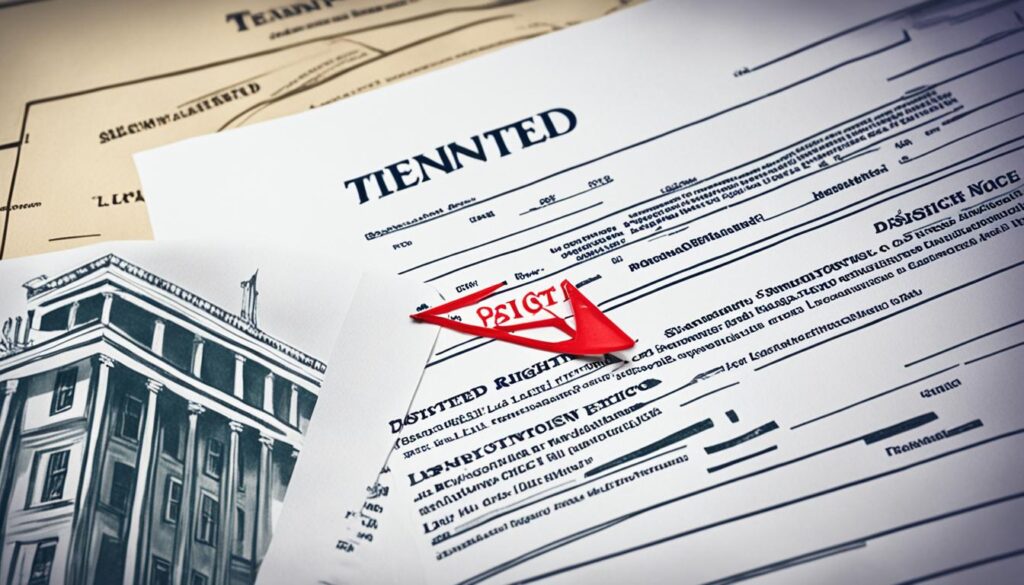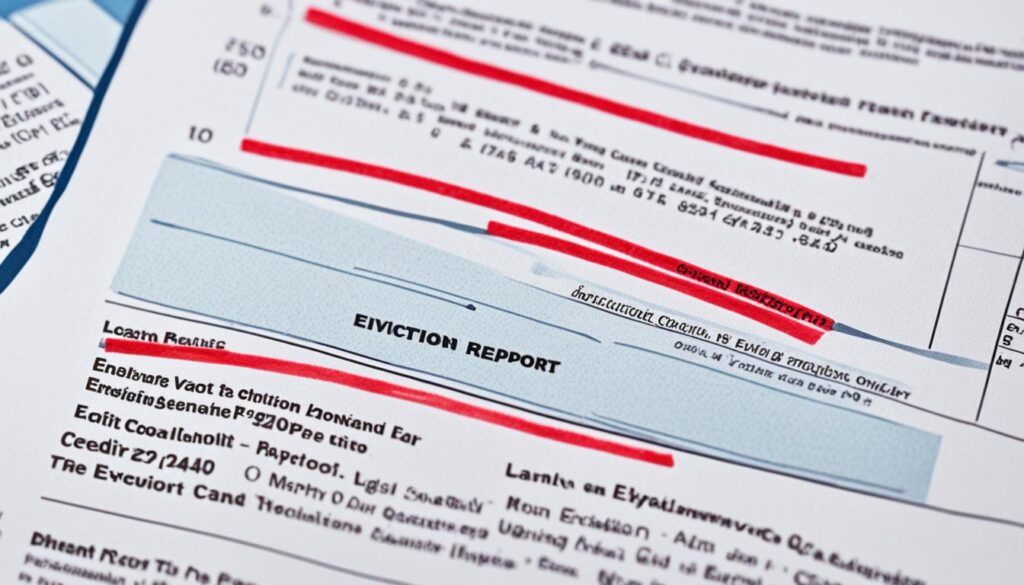Evictions can be stressful and impact your credit report. The good news? You can dispute an eviction on your credit report in certain cases. This can help protect your financial future.
Smart dispute credit repair is key when dealing with eviction records. A thorough credit report check can reveal mistakes or old info. Knowing your rights and the dispute steps is crucial.
Eviction disputes can greatly affect your finances. Learning about the process helps safeguard your credit score. It also improves your chances of renting in the future.
Key Takeaways
- Evictions can be disputed on credit reports under specific conditions
- Credit report analysis is essential for identifying disputable items
- Smart dispute credit repair can help address eviction-related issues
- Understanding your rights is crucial when disputing evictions
- Successful disputes can positively impact your credit score and future rental options
Understanding Evictions and Credit Reports
Evictions can greatly affect your credit report and financial health. Knowing their impact is key for credit score improvement. Let’s explore evictions and credit reports. does eviction hurt your credit, eviction on credit, how long does an eviction stay on your credit report, how many points does an eviction drop your credit score
How evictions appear on credit reports
Evictions don’t show up directly on credit reports. They may appear as collection accounts if landlords use agencies to recover unpaid rent.
These accounts can hurt your credit score. Regular credit monitoring can help you track these changes.
The impact of evictions on credit scores
Eviction-related collections can lower your credit score by 50 to 100 points or more. This drop makes getting loans, credit cards, or new rentals harder.
Duration of eviction records on credit reports
Eviction-related collections usually stay on your credit report for seven years. This starts from the date of the first missed payment.
The long-lasting impact shows why it’s important to address eviction issues quickly.
| Eviction Impact | Duration | Potential Credit Score Drop |
|---|---|---|
| Collection Account | 7 years | 50-100+ points |
| Public Record | 7 years | Varies |
| Rental History | Indefinite | N/A (Not on credit report) |
Knowing how evictions affect credit reports is crucial for managing your financial reputation. Regular credit checks can help track changes.
Taking steps to improve your credit score can lessen an eviction’s long-term effects. Act quickly to protect your financial future.
Legal Grounds for Disputing an Eviction
Knowing your rights is crucial when facing eviction. Valid reasons exist to dispute an eviction on your credit report. Let’s explore these grounds and smart dispute credit repair strategies.
Incorrect Information on the Credit Report
Credit reports can contain errors that unfairly affect your score. You have the right to dispute wrong details about an eviction. Smart dispute credit repair involves carefully reviewing your report and challenging inaccuracies.
Outdated Eviction Records
Evictions typically fall off your credit report after seven years. If you see an old eviction lingering, it’s time to act. Removing outdated records is crucial for credit repair and can improve your score.

Violations of Tenant Rights
Landlords must follow the law when evicting tenants. You may have grounds for dispute if your rights were violated. This could include lack of proper notice or unsafe living conditions.
Knowing your rights is part of smart financial management and identity theft protection. It helps ensure fair treatment and protects your credit score.
“Understanding your legal rights as a tenant is crucial in disputing unfair evictions and protecting your credit score.”
Disputing an eviction ensures your credit report accurately reflects your rental history. This accuracy is vital for future housing opportunities and overall financial health.
Smart Dispute Credit Repair: Strategies for Success
Credit repair blends knowledge and strategy. Analyzing credit reports helps spot errors or outdated info for disputes. Review each entry on your report carefully for accuracy and relevance.
Prioritize disputes for effective credit repair. Target negative items that greatly affect your credit score. These may include late payments, collections, or judgments.
Addressing high-impact items first can lead to faster credit improvements. This approach helps you focus on what matters most.
Debt negotiation is crucial in credit repair. Try settling debts for less or removing negative marks for payment. This method needs careful communication and often works better with professional help.
| Credit Repair Strategy | Potential Impact | Difficulty Level |
|---|---|---|
| Disputing inaccuracies | High | Medium |
| Debt negotiation | Medium to High | High |
| Credit utilization reduction | Medium | Low to Medium |
| Positive credit building | Low to Medium | Low |
Consistency is key in credit repair. Regular report checks and active debt management improve your credit profile. Stay patient and persistent for the best results in your credit journey.
Steps to Dispute an Eviction on Your Credit Report
An eviction on your credit report can be tough. But there are ways to challenge it. Let’s explore how to dispute an eviction entry.
Gathering necessary documentation
Collect all relevant documents. This includes your lease agreement, rent receipts, and landlord communications. These papers will support your case.
Credit monitoring services can track changes to your report during this process.

Contacting credit bureaus
Reach out to Equifax, Experian, and TransUnion. File a dispute with each bureau showing the eviction. Explain why you think the entry is wrong.
Following up on dispute claims
Stay proactive after filing your disputes. Check with credit bureaus regularly on your claim status. Provide any extra information they might need quickly.
Consider joining financial literacy programs. They can teach you to manage your credit better. Reputable credit repair companies may offer guidance too.
“Knowledge is power. The more you understand about credit reports and your rights, the better equipped you’ll be to handle disputes effectively.
Following these steps can boost your chances of success. Stay informed and persistent throughout the process.
Credit Score Improvement After Eviction Disputes
Successful eviction disputes can boost your credit score significantly. Removing negative information from your credit report often improves your score. This process is vital for rebuilding financial standing after housing challenges.
Credit building techniques are crucial for recovery. Positive financial habits can speed up your credit score improvement. Here are some effective strategies:
- Pay bills on time
- Keep credit utilization low
- Diversify your credit mix
- Avoid opening too many new accounts
Consistency is key when working on your credit score. Small improvements can make a big difference over time. Professional credit repair services can help streamline this process for faster results.
Your credit score is like a financial report card. Each positive action you take is an opportunity to earn better grades.”
Regular credit report monitoring is crucial for maintaining your improved score. This habit helps you catch and dispute new inaccuracies quickly. It prevents potential setbacks in your credit recovery journey.
| Action | Potential Impact on Credit Score |
|---|---|
| Successful eviction dispute | +50 to +100 points |
| Consistent on-time payments | +5 to +10 points per month |
| Lowering credit utilization | +20 to +50 points |
Combining these strategies with patience can lead to financial growth. You can turn an eviction dispute into a chance for long-term stability. Stay focused on your goals and watch your credit score improve.
Common Challenges in Eviction Disputes
Disputing an eviction on your credit report can be tricky. Many tenants face roadblocks in clearing their records. Knowing these hurdles can help you prepare better.
Landlord resistance
Some landlords may not cooperate with dispute efforts. They might refuse to provide needed documents or verify information. In such cases, credit counseling services can offer valuable help.
Proof of payment issues
Proving rent payments can be hard if you paid cash or lost receipts. Keep all payment records, including bank statements and money order stubs. These documents are key for debt talks when disputing an eviction.

Navigating complex legal processes
Eviction laws can be confusing for tenants. Many struggle to understand their rights and proper dispute procedures. Legal aid or credit counseling agencies can guide you through this process.
| Challenge | Potential Solution |
|---|---|
| Uncooperative landlord | Seek assistance from tenant rights organizations |
| Lack of payment proof | Gather alternative evidence (bank statements, witness testimonies) |
| Complex legal procedures | Consult with legal aid or credit counseling services |
These challenges may seem overwhelming, but don’t give up. With good prep and persistence, you can dispute an eviction successfully. Use debt negotiation tactics and seek expert help when needed.
Alternatives to Disputing: Credit Building Techniques
Rebuilding credit is crucial when disputing an eviction isn’t an option. Credit building techniques can help you bounce back from eviction’s impact. These strategies offer bankruptcy alternatives and ways to boost your financial standing.
Secured Credit Cards
Secured credit cards are excellent for credit building. You deposit money as collateral, which becomes your credit limit. Use the card wisely by making small purchases.
Pay the balance in full each month. This helps establish a positive payment history.
Credit-Builder Loans
These loans are designed to help build credit. The borrowed money is held in a savings account while you make payments. You receive the funds after paying off the loan.
This method shows your ability to make consistent payments.
Becoming an Authorized User
Ask a trusted person with good credit to add you as an authorized user. Their positive payment history can boost your credit score. Ensure they maintain good habits to avoid negative impacts.
| Credit Building Technique | Pros | Cons |
|---|---|---|
| Secured Credit Cards | Easy to qualify, builds credit history | Requires upfront deposit, may have fees |
| Credit-Builder Loans | Helps save money, improves credit score | Funds not available until loan is paid off |
| Authorized User | Quick boost to credit score, no financial responsibility | Relies on primary user’s good habits |
These credit building techniques can improve your credit score and financial health. They’re effective even after facing challenges like evictions.
Preventing Future Evictions: Financial Literacy Education
Money smarts help avoid evictions. Learning to manage cash is crucial. Financial literacy teaches budgeting and saving skills.
Credit counseling boosts money skills. It offers debt handling tips and credit score improvement advice. Better credit increases housing approval chances.
Free financial education resources are available. Libraries, community centers, and online courses offer valuable lessons. Taking charge of finances helps prevent eviction troubles.
Invest time in money management learning. It’s a smart move with long-term benefits. Financial literacy equips you to handle rent and bills better.
This knowledge safeguards against future eviction risks. A solid financial foundation leads to stable housing. It also provides peace of mind.

